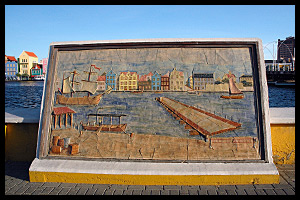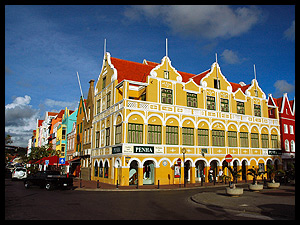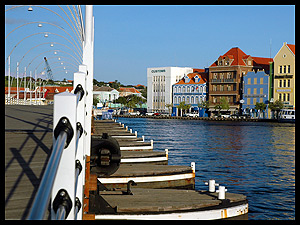|

|
Discovered in 1499, Curacao
is a small island, 38 miles long and between 2 and 7½ miles wide. Its name
derives from the Spanish word Corazon for heart and most likely changed by
Portuguese map makers. It is known locally as Dushi Korsou, Sweet
Curacao.Together with Bonaire, Saba, St. Martin, & St. Eustatius, Curacao
is part of the Netherlands Antilles. Aruba,
Bonaire, and Curacao make up the ABC islands just 35 miles north of the coast
of Venezuela,
well out of the hurricane belt. With its 140,000 residents, Curacao is the
most populated as well as the most Dutch of the Netherlands
Antilles. Tourists not only flock to the island because of its
year round temperatures in the mid 80s but to enjoy the colorful mansions of
Willemstad, duty free shopping, exciting casinos, tourist attractions, and a
myriad of watersports. While primarily Dutch, the warm and friendly locals
have their own culture and even language, Papiamentu, a combination of
French, Spanish, Portuguese, English, Dutch and Arawak Indian.
|

|
With its red roofs and pastel buildings, the capital of Willemstad is a picture
perfect Dutch town. The Queen
Emma Pontoon
Pedestrian Bridge
connects the two sides; Punda, and Otroband (literally “the other
side”). The capital is also the hub of most hotels, entertainment,
casinos, culture & history. Restaurant cuisine is strongly influenced by
Dutch and West Indies flavors. The island is
also known for the unique liquor that bears its name.
Whether you are the type of traveler who likes to relax on
vacation with a rum drink and a book or an adventurer, Curacao
has something to offer everyone. There are over 35 beaches on the island,
some secluded, some with full bars and restaurants. Since the beaches have
been formed in part by coral, it is advised to bring water shoes. The
constant trade winds make it comfortable no matter what the temperature. The
pristine reef, teaming with fish life and a variety of colorful coral runs
parallel to the island. Diving in Curacao is rated among the best in the Caribbean by magazines and the diving community. Most
of the more acclaimed dive sites are on the western coast and are accessible
by shore. Visibility is over 100 feet and the water temp is about 80 degrees.
This also makes snorkeling a favorite pastime with all visitors. There are
other ways to enjoy the crystal blue sea from boating, sailing, kayaking, and
windsurfing to deep sea fishing. There are also programs to swim with the
dolphins and sea lions or feed the turtles at the Curacao Sea Aquarium.
|

|
There is just as much available to do on dry land. Not
only is Willemstad chocked full of boutiques and stores, but there is a daily
floating market where boats from Venezuela dock with produce to sell and to
provide a colorful picture reminder of the city.For the active traveler
Curacao golf courses are beginning to attract golfers worldwide. It’s
almost surreal to golf between high cliffs and a turquoise sea. The constant
breeze can make you unaware of the strength of the sun. It would be wise to wear
sunscreen or a hat on the course. Biking has also evolved on the island.
There are a few trails in Christoffel
National Park that will
take you to unspoiled vistas of the wilder North coast and down to the beach
to cool off with a swim. In 2006, Curacao
hosted not only the World Cup Mountain Bike Race but its annual Amstel Road
Race. There are a number of other parks on the island; Den Dunki National
Park, Midden Seinpost Hill, and Shete
Boka National
Park. Here you can enjoy hiking, bird watching,
and viewing wildlife in their natural habitat. At Hato Caves
you can explore the caves carved out by the power of the ocean and then
etched with petroglyphs over a thousand years ago.
|

|
You can swim with schools of parrot fish, turtles, or
dolphins on Curacao. You can ride a horse or
an ostrich. You can visit nature, the Mikve Israel-Emanuel Synagogue, the oldest
synagogue in continuous use in the Caribbean
since 1732, The Swinging Old Lady, the oldest and longest floating bridge,
one of the Curacao Landhuizens, renovated plantation homes, and the Curacao
Liquor Factory. You can time your visit with Carnival a month long
celebration before Lent, the Jazz or Salsa Festival, the Blue Marlin Release
tournament, the Sailing Regatta, or the International Drag Racing
Competition. Curacao has always been a premiere destination for honeymooners
but others are now discovering that there is a lot to explore and enjoy on
this picturesque serene Caribbean island. We
hope you will too.
|
Links of Interest:
Read Sunshine’s notes
about the West End (Banda Bou)
See Sunshine’s list of useful links
David’s Westpunt Riders youth
club
|






